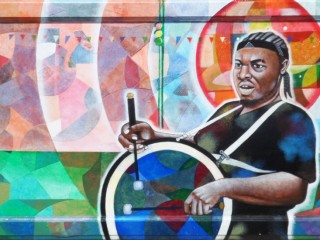
Yesterday in the chill grey rain of winter, we drove up to Crystal Bridges, Alice Walton's benevolent gift to the People of Arkansas, which is just over an hour from our house.
We'd been up to see the long-running exhibit State of the Art a few months ago -- it's just excellent, and we went through it again this time.
But we had somehow missed seeing the Audubon Exhibit, so we drove up to see that; and went through the museum's 19th and 20th century collection as well.
As long-term readers of this blog know, I have my issues with the Waltons (to put it mildly), but it is hard to understate how much this museum means to the people of Arkansas.
Previous to its construction, the nearest museums were in Kansas City, Tulsa, Dallas, and Houston. All of these except Tulsa are really out of reach for any except the upper-class in Arkansas (and very few people in Arkansas rank in the upper-class). This meant no one here saw art, except -- possibly -- in art history classes in high school or college, and then only in reproductions.
As those of you who have access to museums know, this is just not an acceptable substitute. I'd seen Audubon prints all my life -- how could I not, growing up in New Orleans? -- but the paintings themselves, and the lithographs, seen in person, they will knock you down.
Plus, the museum has a wonderful new Hopper:

This image does nothing to represent it. Believe me.
Anyway.
I still wish the Waltons would pay a living wage. (I hear they plan to pay more, so that's something.) I still think their union-busting is despicable and disgusting. I still think the way they treat their women employees is criminal.
But yesterday the museum was filled with families -- many of them working class families; and young people, teens and young adults, many of them having driven miles across Arkansas on their own to see this art; and groups of senior citizens, all of them filled with happiness.
You know, you can't forgive Andrew Carnegie. On the other hand, public libraries.



